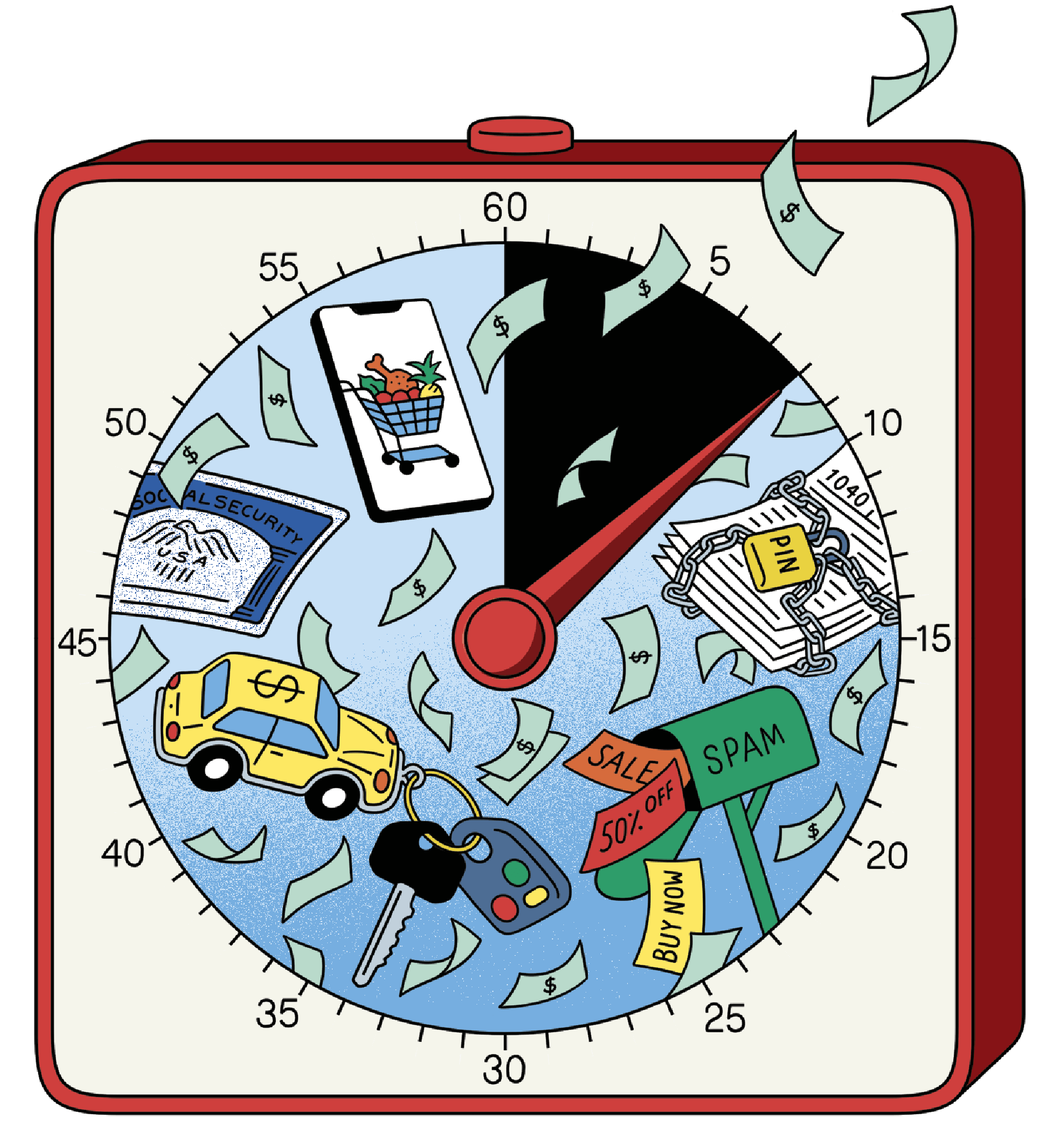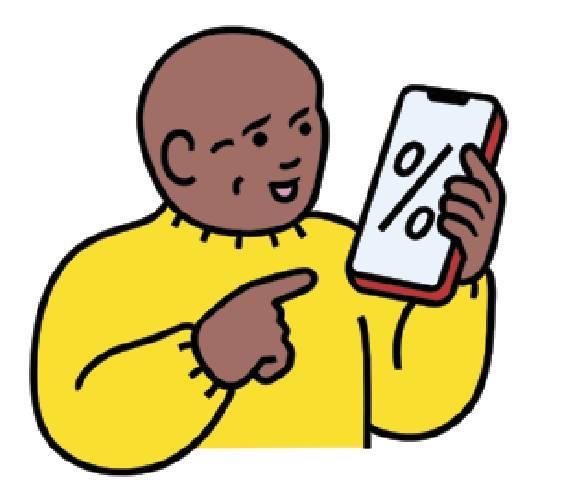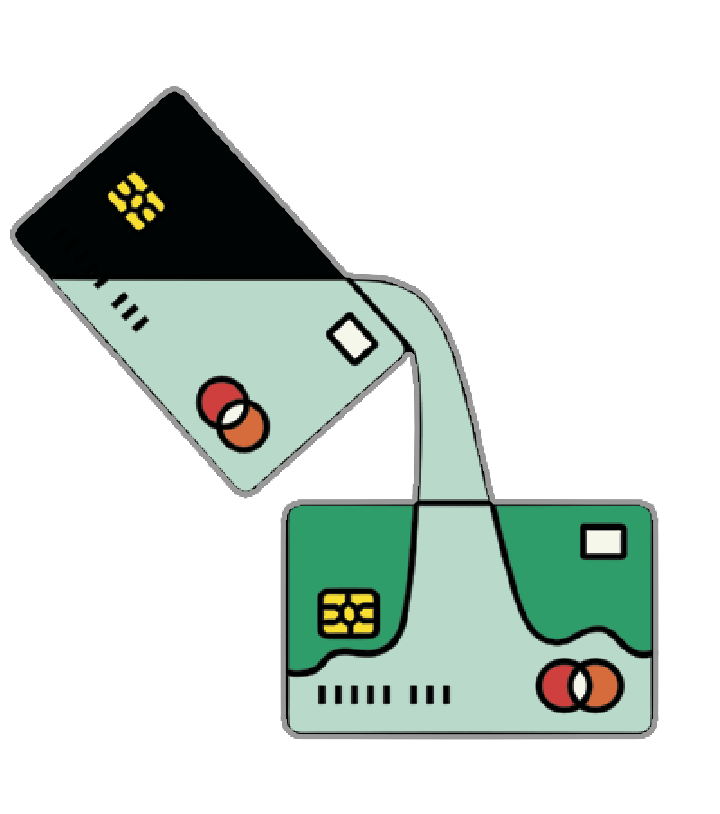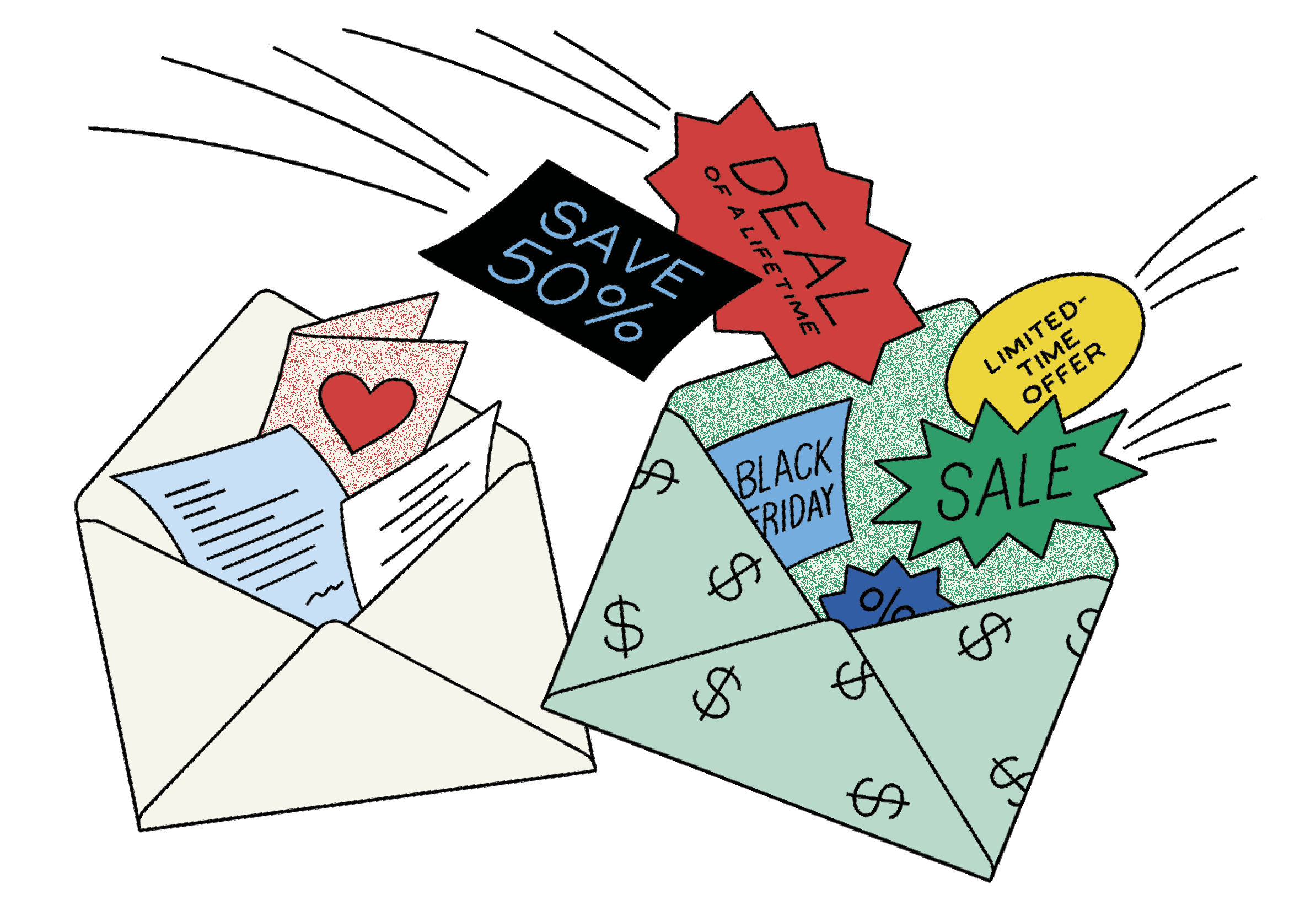MoneySaver
9 Smart Financial Fixes You Can Tackle in an Hour
It doesn’t take long to save money and protect yourself against fraud
by Daniel Bortz
IllustrationS by tomi um

SHORING UP your finances doesn’t have to mean hours of slogging through statements, investments and bills. You have ways to improve your situation quickly. Got 60 spare minutes? Make that time pay off by taking on one or more of these simple tasks.
1. Check your credit report.
A recent survey from the nonprofits Consumer Reports and WorkMoney found that 44 percent of respondents who checked their credit reports spotted at least one error. Mistakes—such as a bill you paid being marked as outstanding—could be dragging down your credit score. Finding an unfamiliar account could help you uncover potential fraud, too.
“Accounts that don’t belong to you are a major red flag,” says Ted Rossman, a credit card analyst at Bankrate. “This could be identity theft or a mix-up, such as someone with a similar name.”
Go to AnnualCreditReport.com to get a free copy of your credit report from each of the three major credit bureaus—Equifax, Experian and TransUnion—or call 877-322-8228.
2. Put your credit on ice.
Freezing your credit prevents credit bureaus from releasing financial information to third parties, making it harder for identity thieves to open accounts in your name.
And you are a juicy target. “Older Americans have often achieved higher credit scores,” Rossman says, “but because they’re not applying for as many loans, fraud could go undetected for longer periods of time.”
You can request a freeze for free, online or by phone, in minutes by contacting each of the three credit bureaus. It’s simple to temporarily lift a credit freeze so that you can open a legitimate account.

3. Sign up for an IRS identity protection PIN.
People ages 65 to 74 are at greater risk of large financial losses from tax-related scams, a 2025 survey by McAfee found. An identity protection (IP) PIN can help protect your taxpayer data from cybercriminals.
To obtain an IP PIN, register for an account with the IRS; visit irs.gov/ippin to get started. Once you verify your identity, you’ll receive a six-digit number to use when filing your taxes. And you’ll get a new IP PIN each year. “This will provide taxpayers with the peace of mind that, come tax time, no one else is claiming a refund in their name,” says Carl Breedlove, a research analyst at the Tax Institute at H&R Block.

TIP: Some grocery apps let you scan barcodes to see if deals are available.
4. Download a few grocery store apps.
By downloading a supermarket’s mobile app and signing up for its loyalty program, you get access to special deals and digital coupons.
“Grocery store apps are one of the most underrated savings tools,” says Stephanie Carls, a retail trends analyst at the coupon site RetailMeNot.
Shop at several grocery stores? You might download Flipp, a free app that lets you select multiple supermarkets and browse their circulars. Participating stores include Aldi, Food Lion, Harris Teeter and Wegmans. Apps like Checkout 51, Ibotta and Receipt Hog let you earn cash back by submitting receipts on purchases from certain supermarkets.
5. Shop for cheaper auto insurance.
Car insurance inflation isn’t going away. The cost of motor vehicle insurance was up 5.3 percent year over year in July, according to the U.S. Bureau of Labor Statistics.
Prices can vary among providers, so it pays to get several offers before renewing your policy. To speed up your insurance shopping, consider getting multiple quotes using a comparison site such as Insurify, Policygenius or The Zebra.
“All the policies that you review should have the same types and amount of coverage,” says Loretta Worters, spokesperson for the Insurance Information Institute. “It is difficult to compare policies, for instance, if one provides $50,000 in property damage liability coverage and another only $30,000.”
6. Apply for a low-interest balance-transfer card.
Nearly half of adults age 50 and up carry credit card debt, a recent AARP survey found. Moving high-interest credit card debt to a balance-transfer credit card with a low introductory interest rate—perhaps even zero percent—could save you a lot if you can pay off the balance before the introductory rate expires. “Signing up for a zero percent balance-transfer card is my favorite credit card debt-payoff tip,” Rossman says.

Many balance-transfer card applications take less than 20 minutes, but you typically need a credit score of about 670 or higher to qualify. Recent options include the U.S. Bank Shield Visa, which offers zero percent interest on balance transfers and new purchases for 24 months; the Wells Fargo Reflect, with zero percent interest on balance transfers and new purchases for 21 months; and the AARP Essential Rewards Mastercard and AARP Travel Rewards Mastercard from Barclays,* both of which offer zero percent interest on balance transfers for 15 months. With all of these cards, you will pay a fee of 5 percent on each transfer.
7. Search for unclaimed assets.
About 1 in 7 Americans have unclaimed cash or property, according to the National Association of Unclaimed Property Administrators (NAUPA). “Unclaimed property can be anything from forgotten checking accounts, payroll checks, insurance payments—even the contents of a safe-deposit box,” says Shaun Snyder, CEO of the National Association of State Treasurers.
You can go to MissingMoney.com to find unclaimed property in states where you’ve lived or worked. In one shot, you can search 49 states, Washington, D.C., and Puerto Rico (to search Hawai‘i, visit hawaii.gov). The free website, provided by NAUPA, also contains a national index with direct links and contact information for each state’s official unclaimed property program.

8. Create an email account for shopping promotions.
Signing up for promotions, newsletters and other email communication from retailers where you shop regularly can get you many deals and discounts. But those emails could also lure you into spending money on things you don’t really need. A better approach is to set up an email address specifically for shopping.
Doing this “is one of those small moves that can lead to big savings,” Carls says. “It keeps your main inbox clutter-free while giving you first dibs on deals, exclusive codes and early sale alerts from your favorite retailers. It’s a smart way to stay in the know without the constant temptation to shop every time you check your regular email.”

TIP: Simply signing up for email alerts can earn you an immediate discount from many retailers.
9. Get online access to your Social Security information.
In case you haven’t done so already, go to ssa.gov/myaccount to set up an online My Social Security account. If you are not yet receiving benefits, you’ll get access to personalized Social Security data, including estimates of your monthly payment at different claiming ages. If you’re already receiving benefits, you can use the site for additional tasks, such as changing direct deposit information.
To avoid scams, don’t share your account credentials or login authentication codes with anyone.
Daniel Bortz is a personal finance editor at AARP.
One-Hour Strategies for Making Money
Consider these quick ways to raise extra cash
UNLOAD A GIFT CARD
You can sell (at a discount to face value) unused gift cards and store credit on marketplaces like CardCash, GCX, GiftCardOutlets and GiftCash. Some marketplaces, however, don’t accept gift cards that have expiration dates.
TRADE IN A GADGET
Some retailers offer gift cards or store credit for used electronics, including laptops, tablets, cellphones, streaming media players and wireless routers. Amazon, Best Buy, Costco, Sam’s Club, Staples, Target and Walmart all operate such trade-in programs.
USE YOUR TYPING SKILLS
Transcribe audio and video recordings of phone calls, conference meetings and courtroom hearings for companies like GoTranscript, Rev and Speechpad. Payment is usually a flat rate for each minute of the recording you transcribe.
Visit aarp.org/99waystosave for more ways to cut costs.
*Barclays pays AARP a royalty for use of its intellectual property.